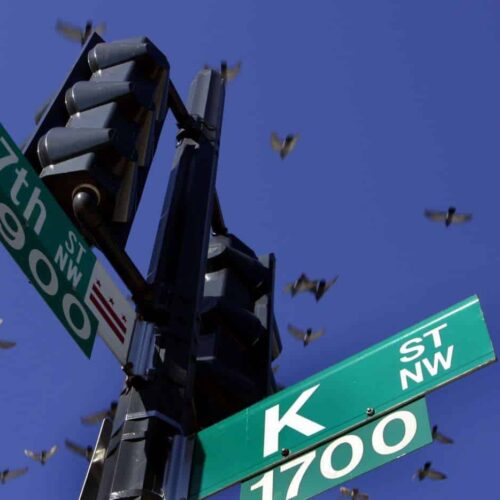Introduction
Every three months for three years, when federal law compelled the Carmen Group to publicly describe its federal lobbying efforts on behalf of Xavier University of Louisiana, the firm used the vaguely worded phrase: “Hurricane Katrina related recovery issues.”
It’s akin to calling Hurricane Katrina a weather event.
The firm’s true objective was to “devise and implement strategy” to convince federal officials they should forgive $130 million worth of emergency loans the U.S. Department of Education gave the storm-battered university.
The lobbying gambit met with some success: Sen. Mary Landrieu, D-La., successfully included a loan modification plan for the university in an omnibus spending bill — something Xavier University President Norman Francis publicly lauded as “critical and important.”
The Carmen Group later praised itself as “instrumental in drafting and securing legislation … which provided for loan modification relief” for Xavier University it valued at more than $45 million.
In keeping with the Lobbying Disclosure Act, the public should seemingly know of a lobbyist’s attempts to secure forgiveness or modification of a taxpayer-funded loan worth tens of millions of dollars.
Lobbying firm fined for disclosure violations
But were it not for a lawsuit, which detailed a dispute between the university and the firm, the public would be unaware of what Carmen was really hired to do, despite a law requiring that it describe its activities with specificity.
The Lobbying Disclosure Act says “public confidence in the integrity of government” will increase when “the identity and the extent of the efforts of paid lobbyists to influence federal officials” is disclosed.
Apart from the case of Carmen and Xavier, details contained in a half-dozen other lobbying proposals and service contracts obtained by the Center for Public Integrity through state and federal court filings as well as freedom of information requests reveal exponentially more information about lobbying efforts than what’s contained in quarterly reports submitted to the U.S. Senate and U.S. House.
Reforms fall short
Lobbyists seldom get into trouble for filing such a paucity of information despite the 2007 passage of the Honest Leadership and Open Government Act, in the aftermath of the Jack Abramoff scandal.
The bill, House Speaker Nancy Pelosi declared upon its introduction, would help create the “most open and honest Congress in history.” President George W. Bush said upon signing it into law that it didn’t go far enough, and that he would “work with the Congress to improve upon this legislation.”
At first, the reforms showed promise.
The law’s “full public disclosure of lobbying” section requires lobbyists to file disclosures electronically and do so quarterly instead of semiannually. It requires them to provide more information about clients and detail political contributions. It increased civil and criminal penalties for failing to comply with disclosure requirements.
Despite the increased penalties, lobbyists routinely sidestep the law’s disclosure requirements. They also avoid the ban on buying members of Congress meals and gifts by throwing lavish campaign fundraisers for them— events that remain perfectly legal. Lobbyists also continue to bundle campaign donations for notable lawmakers, though they are required to disclose the contributions.
Many lobbyists have avoided detection altogether and have stopped registering, even as they continue their employment with the same firms where they represent the same set of clients. Some firmly argue that they’re well within their rights not to register.
Abramoff — a former super lobbyist who served 3 ½ years in prison for fraud and corruption — himself considers the reforms made in his name a failure and lobbying disclosure rules a veritable mess.
“After everyone erected the gallows for me, they just went back to what they were doing before,” Abramoff said. “Gigantic problems remain.”
Some lawmakers — even lobbyists themselves — believe it’s again time to reform the way lobbyists are allowed to ply their craft.
Little enforcement
Lobbyist registration is required when an influence practitioner spends at least 20 percent of his or her time for a paying client lobbying the federal government, per the complex federal definitions of “lobbyist” and “lobbying activities.”
As regulations have tightened and anti-lobbyist actions have heightened, the overall number of federally registered lobbyists has declined. The amount of money reportedly spent on federal lobbying efforts has also slipped each year since 2010, according to the Center for Responsive Politics.
The drop, some have theorized, may be due to more lobbyists terminating their registrations rather than doing less influencing. President Barack Obama’s executive actions against the profession may have prompted lobbyists to go underground. And there is little fear of punishment for unregistered lobbying.
“There are certainly firms, here and there, that should probably register but do not,” said Rob Kelner, chairman of law and lobbying firm Covington & Burling’s election and political law practice group. “It’s not hard to operate in a way to avoid the need to register. People now push the envelope and take risks they might not otherwise take.”
Abramoff, who since exiting prison has fashioned himself a reformer, says the very word “lobbyist” is pejorative, and therefore, “you come off as a lot more wholesome when you say you’re a ‘strategic adviser.’ ”
But strong lobbying laws don’t mean strong enforcement, as the federal government doesn’t put much effort into policing the lobbying industry.
The U.S. Attorney’s Office for the District of Columbia is tasked by Congress with investigating potential violations of the Lobbying Disclosure Act, most of which arrive in the form of referrals from Congress’ clerk of the House or secretary of the Senate.
Lobbyists who violate federal disclosure provisions could face a $200,000 fine and up to five years in prison — seemingly strict punishments created as part of the Honest Leadership and Open Government Act.
But of the 3,042 referrals the U.S. Attorney’s Office for the District of Columbia received from 2009 to 2012, almost all resulted in no penalties, according to a U.S. Government Accountability Office report. The handful that have ever resulted in fines involve lobbying law violations that are absurdly overt and sustained.
Unregistered go unchecked
Likewise, the vast majority of referrals involve registered lobbyists potentially acting badly, not un-lobbyists who should be registering and disclosing their activities but do not.
The issue of illegally unregistered lobbyists “isn’t outside the purview” of the U.S. Attorney’s Office for the District of Columbia, spokesman William Miller said. “However, the referrals we are statutorily required to receive from Congress mainly consist of registered lobbyists who fail to file required reports.”
The U.S. Attorney’s Office for the District of Columbia uses a contract paralegal to work full time on lobbying-related cases, Miller said. Five civil attorneys and one criminal attorney, who are supervised by a deputy chief in the office’s civil division, are also available to work on lobbying cases, as needed, he said.
“We continually assess our resource needs throughout the office and will make adjustments as necessary, in this area, and in all of our practice areas,” Miller said.
Perhaps sensing a power vacuum, other government entities not typically associated with lobbying enforcement have recently asserted themselves.
Audit firm Ernst & Young, which operates a federal lobbying subsidiary, last month agreed to pay $4 million to settle a case brought by the Securities and Exchange Commission that the firm had illegal potential conflicts of interest because it lobbied on behalf of two audit clients.
And the Office of Congressional Ethics, an independent and little-known congressional operation, in July accused an unnamed “entity” of breaking lobbying laws by not registering to lobby. It’s the first time the office, which typically trades in questionable campaign, travel and expenditure activities among congressional members and employees, took such an action against what appears to be a government influence operation.
Nevertheless, such instances remain rare.
Constitutional right
Former Sen. Bob Bennett, R-Utah, who in 2013 registered as a lobbyist on the first day his two-year lobbying ban under the Honest Leadership and Open Government Act expired, scoffs at efforts to squelch hired political influencers.
He, like hundreds of other former Republican and Democratic members of Congress, quickly entered the government influence industry upon exiting public service, saying he has every right to do so.
Indeed, the right “to petition the government for a redress of grievances” — in other words, lobby on behalf of any interest or cause — is enshrined in the U.S. Constitution’s First Amendment alongside the freedoms of religion, speech, press and assembly.
Lobbyists make lots of money because they are effective, and they are effective because Congress can be a scary place for a novice.
“A lobbyist’s stock in trade is his knowledge of the way the system works,” said Bennett, one of 17 senators to co-sponsor the lobbying reform act, although he said he does not remember being a co-sponsor. “If you have an issue that is very complex, going to Congress without a lobbyist is like going to court without a lawyer.”
Like Xavier University and many other colleges, Missouri State University sought professional lobbying help to secure federal funding.
The school hired lobbying giant Patton Boggs LLP (now Squire Patton Boggs) in 2007, with the firm disclosing in a federal filing that it would lobby for Missouri State on “BUD” and “EDU” — codes for budget and education issues. Under the heading “specific lobbying issues,” it listed only “funding for various education programs.” Later filings generally disclosed lobbying on appropriations bills.
But in its 2007 contract with Missouri State University, Patton Boggs provided a five-page game plan for influencing lawmakers and helping the school win federal money.
The firm boasted of its “close ties” with the Missouri congressional delegation and name-dropped seven federal lawmakers, including Sens. Kit Bond and Claire McCaskill and now-Sen. Roy Blunt, each of Missouri. In a separate 2012 contract, Patton Boggs added Rep. Billy Long to its friends list and mentioned how Rep. Kenny Hulshof’s political committee had been a firm client.
The contract promised the university “direct access to decision makers at senior levels in the government.” The firm would use its “knowledge of the legislative process” to attract grants and obtain line-item funding in appropriations bills.
The 2012 contract noted that “Patton Boggs will assist Missouri State by seeking Congressional appropriations for your priority objectives — in preparation for a possible return to the practice of earmarking appropriation bills.”
In a lobbying proposal in 2008 to Louisiana-based building securities firm MBI Global, Patton Boggs said it could help the company “become a major player with the numerous agencies within the U.S. Department of Defense” by “providing you with direct access to the Department of Defense so that you can reach the people who will make the decision to purchase and use your technology.”
Patton Boggs declined to comment on its clients or disclosure practices. “We’re not really in the habit of discussing our contracts,” firm spokesman Angelo Kakolyris said.
Change urged
Upset with the Honest Leadership and Open Government Act’s legacy to date, several Democratic lawmakers are bent on changing it through legislation.
Rep. Mike Quigley, D-Ill., wants to create a Lobbying Disclosure Act enforcement task force within the Justice Department, assign lobbyists identification numbers and require lobbyists to undergo ethics training.
Rep. Alan Grayson, D-Fla., is intent on banning corporations from making election-season communications if they employ registered federal lobbyists.
Sen. Michael Bennet, D-Colo., aims to compel more people to register as lobbyists and ban Senate candidates from soliciting registered lobbyists for campaign contributions.
Bennet in June also introduced separate legislation that would in part ban any former member of Congress from lobbying “any Member, officer, or employee of either House of Congress or any employee of any other legislative office of the Congress.” Rep. David Cicilline, D-R.I., has introduced similar legislation in the House, as has Rep. Bill Posey, R-Fla.
Bennet could not be reached for comment, but Sen. Jon Tester, D-Mont., the bill’s lead co-sponsor, told the Center for Public Integrity that while the Honest Leadership and Open Government Act was a “good first step, it’s now time to take the next step … because the revolving door has to stop.”
Even the Association of Government Relations Professionals, the nation’s largest lobbying trade group, supports some of the reforms contained within the various bills.
“The current laws regulating lobbying were a good first step to open up the government and ensure a baseline of transparency. However, there are many improvements that can be made,” said Monte Ward, the organization’s president. “We are reviewing the proposals with a keen eye towards the balance between increased transparency, respect for the First Amendment and over-regulation of the profession.”
None of the bills are, at this juncture, close to being passed; most are mired in committee.
And with Congress in the teeth of election season and hard pressed to agree on much of anything this session, does Tester believe the bill has any chance of advancement?
“It’s going to be a tough fight, because many people don’t like this bill because they’d be impacted by it,” Tester said.
Other, more informal lobbying proposals also abound.
Kelner, of Covington & Burling, suggested changing federal law to put lobbying enforcement in the hands of the main U.S. Department of Justice, not the U.S. Attorney for the District of Columbia.
Craig Holman, a lobbyist with Public Citizen, supports one working model that already exists: the Foreign Agents Registration Act, administered by the Department of Justice.
Among its requirements, it demands lobbying firms that represent foreign governments disclose lobbying contacts and a list of every meeting they set up for their clients, in addition to filing more typical lobbying disclosures. Non-FARA lobbying reports filed by most lobbyists “do not provide the public with sufficient information about the scope and targets of a lobbying campaign,” Holman said.
But the idea of reporting all lobbying contacts strikes others as excessive and prone to manipulation. Tom Susman, director of governmental affairs for the American Bar Association and a longtime registered lobbyist, argued that such a measure would be too easy to defeat.
For instance, lobbyists could schedule meetings that don’t align with their clients’ interests only with the intent to deceive. On the other hand, politicians may grow wary of meeting with dissident voices for fear of losing favor with their parties or constituents.
“It would have a chilling effect in just the wrong way,” Susman said.
‘Keep the contract … confidential’
As for Xavier and the Carmen Group, all did not end well in regard to their dealings. A disagreement over their lobbying contract ultimately landed them in court.
The university has maintained that the Carmen Group failed to fully deliver on its promise to seek forgiveness of the loan, having only secured a loan modification. Leading the firm’s efforts for Xavier was David Carmen, the firm’s founder; lobbyist John Ladd, a former chief counsel of the House Judiciary Committee; and Peter Oppenheimer, a former congressional and State Department intern.
The Carmen Group responded by suing its former client for nonpayment of $270,000 in lobbying fees. The dispute is ongoing.
But no one involved in the lobbying effort is much interested in saying more about it.
Marc Miller, general counsel for the Carmen Group, says his firm complied with federal lobbying law when disclosing its activity on behalf of Xavier University. The firm has never had any issues with its disclosure filings, he added. Miller declined to discuss the firm’s relationship with Xavier University or specific elements of its agreement.
Xavier University representatives also declined to comment. But in a 2010 email from Xavier University official Gene D’Amour to the Carmen Group, the university made it clear that the school’s president wanted no more publicity about its relationship than necessary.
“Dr. Francis would like us to keep the contract, especially the amount we are paying, confidential,” D’Amour wrote.
Landrieu, the U.S. senator who took credit last year for securing Xavier University’s loan modification, said at the time that her efforts would remove “a serious economic burden” from Xavier and other Louisiana schools, which she thanked for their “partnership.”
Never mentioned in her office’s public statements was the Carmen Group, which had privately taken credit for orchestrating the deal.
Landrieu’s office did not respond to multiple requests for comment.
Read more in Money and Democracy
Money and Democracy
Koch foundation proposal to college: Teach our curriculum, get millions
Documents show group sought control over hiring at Florida State
The Misinformation Industry
Koch-funded think tank offers schools course in libertarianism
Anti-government, pro-market philosophy is pushed for use by college, high school teachers




Join the conversation
Show Comments